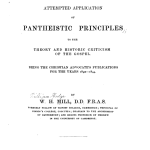When I was in seminary, the “New Perspective on Paul” was all the rage – you either loved it or hated it. I did some adjuncting at a seminary before starting my PhD and I taught a course on Paul. I taught mostly a “pro-NPP” perspective, and several students protested, threatening to have me fired (because I was promoting heresy). In response, I had to write a “position paper” for the faculty and the community to show that the NPP could be biblically supported. My adjunct work was saved, but only as one passing through the flames!
Part of the reason I went to Durham was to learn from the NPP greats, N.T. Wright (then Bishop of Durham) and James D.G. Dunn (retired, but graciously willing to meet with students). At Durham, there were also friendly critics of the NPP: John Barclay (now more and more vocal about his criticisms) and Francis Watson (wanting to move beyond the NPP). Many have hailed the current era one of “post-NPP” and some have decried the NPP as basically a social gospel that we can lay aside as not very theological.
It is Dunn’s work especially that I have tried to track very closely these last 15 years or so, and I think Dunn offers a very powerful reading of texts like Romans and Galatians. Thus, I am not willing to “give up” on the NPP, just because we are so very tired of talking about “works of the Law.”
 In comes The Apostle Paul and the Christian Life: Ethical and Missional Implications of the New Perspective (ed. Scot McKnight and Joseph Modica). This is an attempt to show that the NPP (its core ideas) is still a very strong interpretation of Paul and (as the title/subtitle suggest) has dynamic theological implications that help us better understand the Christian life. Contributors include McKnight, James Dunn, N.T. Wright, and Bruce Longenecker (and others too).
In comes The Apostle Paul and the Christian Life: Ethical and Missional Implications of the New Perspective (ed. Scot McKnight and Joseph Modica). This is an attempt to show that the NPP (its core ideas) is still a very strong interpretation of Paul and (as the title/subtitle suggest) has dynamic theological implications that help us better understand the Christian life. Contributors include McKnight, James Dunn, N.T. Wright, and Bruce Longenecker (and others too).
I found reading this book very energizing; the contributors help to bring Paul and his vision of mission, holiness, discipleship, and justice to life. I am already planning to use an essay or two for a seminar next year on Paul’s Theology.
Here is the endorsement I wrote for the book:
“‘Can these dry bones (of academic theories) live?’ This question–the ‘so what’ factor–is not asked often enough in academia. But this book commences with the ‘so what’ question in regard to the new perspective on Paul. In recent years, some have declared the new perspective to be passé at best and dead at worst. The contributors to this book make a cogent case not only that the new perspective is still a compelling reading of Paul in his context but also that it draws out a depth and vitality in his theology and spirituality that can guide the Christian life and the church’s life today.”











